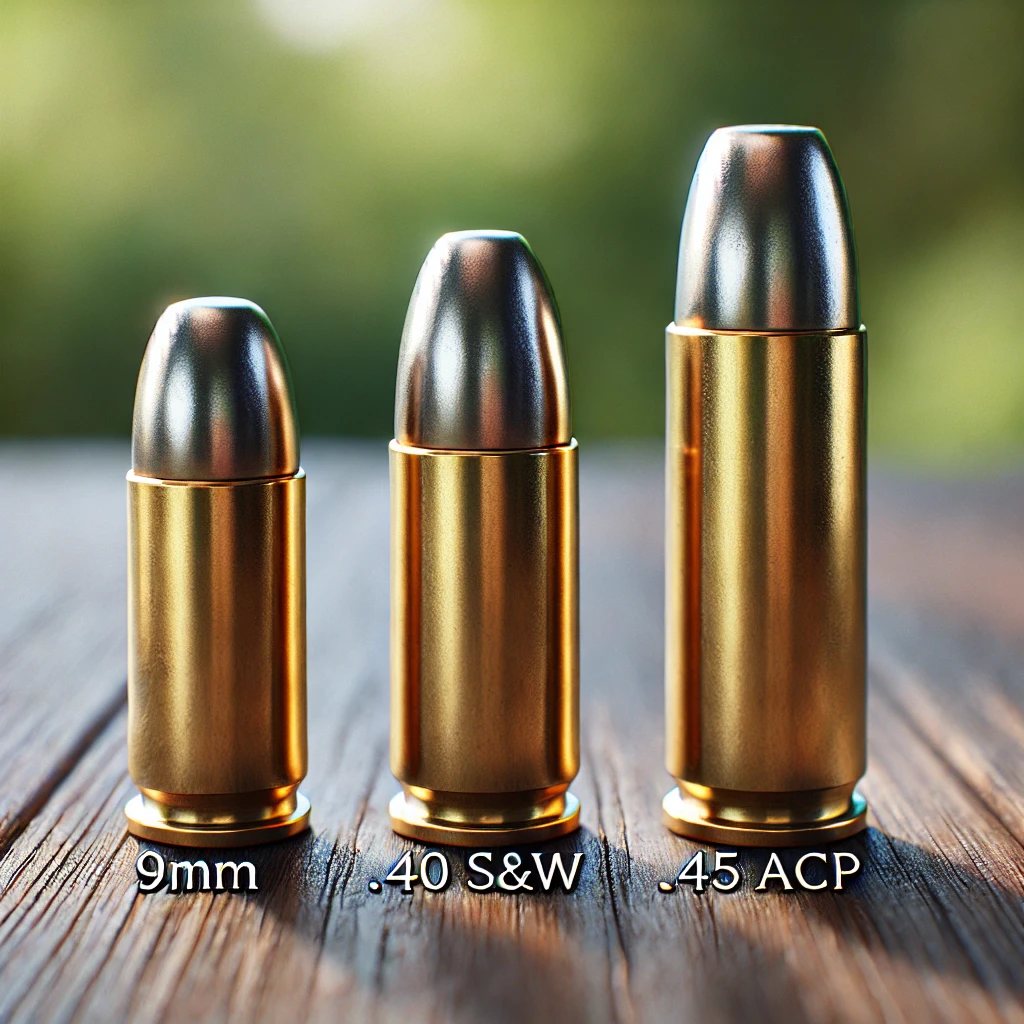
What Caliber Should You Get? The Simple Answer (And Why It Makes Sense)
One of the most common questions I hear in my classes is:
“What caliber should I get?”
If you’re a TL;DR kind of person, here’s your answer: Get a 9mm.
But if you want to understand why—and make the most informed decision possible—keep reading.
The Three Most Common Carry Calibers
When it comes to self-defense, three handgun calibers dominate the conversation:
- 9mm
- .40 S&W
- .45 ACP
Each has its die-hard supporters, and the debate over which is “best” can get as heated as the age-old Ford vs. Chevy vs. Dodge argument.
But when you strip away personal bias and look at the facts, there’s no clear winner in terms of terminal ballistics(how the bullet performs when it hits its target). Modern ammunition technology has leveled the playing field, meaning all three can do the job.
So if they’re equal in effectiveness, what sets the 9mm apart?
Why 9mm Wins for Everyday Carry
1. A Lighter, More Comfortable Firearm
If you’re carrying a gun daily, comfort matters—a lot. A lighter and smaller gun is far more likely to be carried consistently, and in almost every case, a 9mm pistol will be lighter and more compact than a comparable .40 S&W or .45 ACP.
Even if you prefer a full-size gun (like I do), a 9mm version will be easier to manage and conceal than its larger-caliber counterparts.
2. Higher Magazine Capacity
Let’s talk numbers. In a self-defense scenario, studies suggest you’ll likely need 3 to 5 rounds to stop an attacker. And these days, you may not just be facing one bad guy—there could be two or more.
Let’s do some quick math:
- If you fire 4 rounds per threat, and you’re facing 3 attackers, that’s 12 rounds minimum before you even consider misses or the need for follow-up shots.
- That means you need a gun that holds at least 12 rounds, loaded and ready.
Which calibers meet this standard in most commonly available handguns?
- 9mm? Yes. Most standard 9mm pistols hold 12+ rounds without any modifications.
- .40 S&W? Sometimes. Many .40 pistols hold around 10 to 12 rounds in a standard magazine.
- .45 ACP? Rarely. Most .45 ACP handguns max out at 8 to 10 rounds in standard configurations.
Simply put, 9mm gives you more rounds in a lighter package. More rounds means more chances to stop the threat—which can make all the difference in a real-world encounter.
3. Less Recoil, Faster Follow-Up Shots
Another advantage of the 9mm? Lower recoil.
- Less recoil means you can shoot faster and more accurately under stress.
- Faster, more accurate follow-up shots mean you can stop a threat more effectively.
While .40 S&W and .45 ACP pack more punch per shot, that extra recoil slows down follow-up shots and can make training harder—especially for newer shooters.
4. Cost Comparison: More Training for Your Money
Another major advantage of 9mm? It’s the most affordable of the three.
Sure, some niche calibers may be cheaper, but when you compare the same type of round across all three calibers—9mm, .40 S&W, and .45 ACP—9mm is consistently the lowest cost.
Why does this matter? Not because you’ll be thinking, “Man, that round was 7 cents more expensive to save my life,” but because regular training matters.
The lower cost of feeding your gun means it’s easier to train frequently, which makes you a better, safer shooter. If you ever need to defend yourself, the skill you’ve built through training will be far more important than the extra grain weight of a bullet.
What About Revolvers?
Some folks might ask, “Can’t a revolver work for self-defense?”
Sure—but the same logic applies.
Most revolvers:
- Hold 5 to 6 rounds—which may not be enough in a real-world scenario.
- Are bulkier and heavier compared to similar-capacity semi-autos.
- Have longer reload times—which is a major disadvantage in a high-stress situation.
For those reasons, I don’t recommend a revolver as a primary self-defense tool. They have their place, but that’s a discussion for another post.
Final Thoughts
So, what caliber should you get?
9mm. It’s lightweight, easy to carry, has higher capacity, and lets you shoot faster and train more affordably all of these tend to produce better results when it matters most.
The brand and model of your firearm? That’s a whole different debate for another day.
If you’re considering getting your first defensive handgun—or upgrading to something better—come train with us.We’ll help you build real confidence, not just check a box.
Want to learn more about defensive shooting? Check out our upcoming classes: IdahoGunSchool.com/calendar